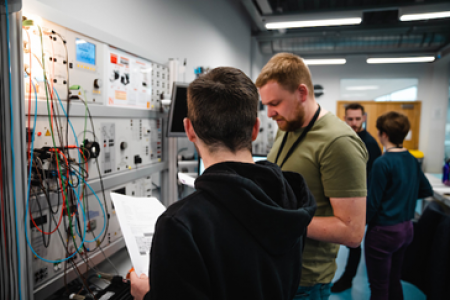
University of Bolton, Deane Road, Bolton. BL3 5AB
Tel:
Email:


“At the University of Bolton, we take great pride in providing a quality, supportive learning environment for our students.”
Professor George E Holmes DL | President & Vice Chancellor
“...tutors are very supportive and you’re not just a student ID number, at this university you are an individual with a name.”
Ellisse Vernon | BSc (Hons) Adult Nursing
Back to menu
Back to menu
Study with an Off-Campus Partner
Back to menu
Back to menu
University of Bolton, why we are the right choice
Location - Bolton, Greater Manchester

02/07/2022
Let there be light! Everyone needs electricity!
In an ever-evolving digital world, advancing technology has had a major impact on several areas; and electronic engineering is no different. From the advancement of artificial intelligence (AI) to the internet of things (IoT), and 5G technology, 2023 is set to be an exciting year for the sector.
This blog explores some of the key trends we expect to see this year in the electronic engineering sector.

The Internet-of-Things (IoT)
It's safe to say that the technology world has been taken by storm, and IT professionals have needed to think of a name that defines the billions of physical devices that are now connected to the internet; IoT. To dig deeper, these devices not only collect online data, but they also share it. IoT, along with AI, has become one of the most important trends in high-tech over the past few years, so the latest advancements and applications of it is something that you need to be aware of if you have a passion for becoming an IT professional:
- Edge Computing
- Smart Stores
- Smart Cities
- Connected Smart Cars
- 5G Technology... Stay tuned for more!
The number of devices connected to the internet will continue to grow rapidly; causing the increased need to develop new and innovative ways to manage all this data.
5G Technology
Currently, you’d have to be someone with the newest model of iPhone for example to have access to 5G data. However, with wireless technology set to keep evolving, this is something that we could expect to see released to many more smartphones in the future. This is an exciting innovation in the world of electronic engineering as it offers faster speeds and more reliable connections than previous generations. If you haven’t experienced 5G already, then watch this space!
Move to Miniaturisation
Miniaturisation is an element of electronic engineering that has been continuously developing for many years now. Take the introduction of the first computer, for example. Remember the size of it? The key reason why engineers have gradually been able to reduce the size to what it is today is due to the constant advancement of semiconductor technology. This is because it allows engineers to pack more components into smaller spaces. As this trend sets to continue, we can expect the production of ever-more compact electronic devices such as smartphones, wearable computers, and implantable medical devices.
Study a Master’s in Electronic Engineering
Looking to expand on your undergraduate electronic engineering knowledge?
An MSc Electrical and Electronic Engineering degree from the University of Bolton can equip graduates with the advanced skills in this specialist field. Exploring key areas such as embedded systems, smart engineering, power electronics, electrical machine, and drive systems, our quality lecturers nurture our postgraduate students for a successful career.
Let’s explore some of the course highlights:
- The course is designed to meet UK professional institution standards and support your achievement of a Chartered Engineer status
- Your studies will be based on the use of industry-standard software tools for design, simulation and analysis, together with test and validation in our industry-spec laboratories
- Students project and dissertation work will focus on industrially relevant design and research activity with design elements, as well as the use of advanced software tools
At Bolton, we are proud to provide a teaching-intensive, research-informed approach to supporting our students. If this sounds like the right environment to help you succeed in your master’s degree, then click here to view our course in more details.
For further information, please contact us at enquiries@bolton.ac.uk or call us on 01204 900600.